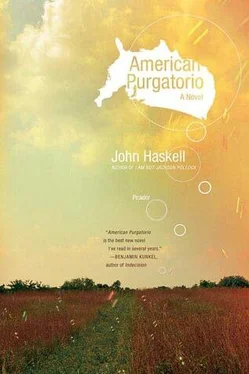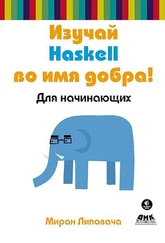John Haskell - American Purgatorio
Здесь есть возможность читать онлайн «John Haskell - American Purgatorio» весь текст электронной книги совершенно бесплатно (целиком полную версию без сокращений). В некоторых случаях можно слушать аудио, скачать через торрент в формате fb2 и присутствует краткое содержание. Год выпуска: 2006, Издательство: Picador, Жанр: Современная проза, на английском языке. Описание произведения, (предисловие) а так же отзывы посетителей доступны на портале библиотеки ЛибКат.
- Название:American Purgatorio
- Автор:
- Издательство:Picador
- Жанр:
- Год:2006
- ISBN:нет данных
- Рейтинг книги:3 / 5. Голосов: 1
-
Избранное:Добавить в избранное
- Отзывы:
-
Ваша оценка:
- 60
- 1
- 2
- 3
- 4
- 5
American Purgatorio: краткое содержание, описание и аннотация
Предлагаем к чтению аннотацию, описание, краткое содержание или предисловие (зависит от того, что написал сам автор книги «American Purgatorio»). Если вы не нашли необходимую информацию о книге — напишите в комментариях, мы постараемся отыскать её.
Los Angeles Times
American Purgatorio — читать онлайн бесплатно полную книгу (весь текст) целиком
Ниже представлен текст книги, разбитый по страницам. Система сохранения места последней прочитанной страницы, позволяет с удобством читать онлайн бесплатно книгу «American Purgatorio», без необходимости каждый раз заново искать на чём Вы остановились. Поставьте закладку, и сможете в любой момент перейти на страницу, на которой закончили чтение.
Интервал:
Закладка:
I didn’t mind losing my pack or my clothes or even my notebook. But my photographs were in that pack. Anne, or what was left of Anne, was in that car. There was still a memory, the trace of memory, but everything else was gone. And I tried to see this as something new, a fresh start. I told myself that now, with nothing, I was a new man. I tried to see myself as reborn, but by this point I was getting a little tired of being constantly reborn.
4
I was thinking about Chief Joseph, the leader of the Nez Perce Indians, who in 1877 was put on a reservation. He had signed a treaty with the United States government, but because of a gold rush on his ancestral land was forced to flee that land and fight for that land, until, when the hopelessness of his struggle became obvious, he surrendered. “I am tired,” he said. “I will fight no more forever.” He was then taken to a reservation where he survived to see his people decimated by disease.
He didn’t have to survive, I thought. And I didn’t have to survive, but it was habit now, or genetic, and once I got my bearings, the first thing I did was make a phone call. I was going to call and get some money, but to make a call I needed money, and I didn’t have any, not even a thin quarter, so I stood by the entrance to a convenience store near the beach and asked people coming out for change.
Simple enough, I thought. I was an honest-looking person, and as people walked out of the Speedy Mart or the Quick Mart I tried to explain my situation. “What happened to me…” but before I could get started the people left me standing in the gum-stained entrance. So I changed my approach, got straight to the point. “Can I have a quarter?” I said, first to a woman, then to a girl, then a man, and you’d think, by the way these people refused to look at me, that a quarter was a lot of money.
For a while no one even acknowledged my existence, so instead of asking them to put a quarter in my open palm, I found a plastic bag and held that out, and maybe it was the bag or a new attitude, anyway, someone finally put a quarter in the bag and with it I called American Express.
I was thinking they would help but after finally getting through to the woman on the other end, she told me that my card had been terminated. I asked if it was possible to get a loan and I could tell by her tone of voice, even over the phone, even though she was calling me “sir,” that I didn’t really exist for her. She didn’t say anything disrespectful — the call might have been monitored — but I got the idea I was on my own.
Fine, I thought. Or as Jimbo used to say, Whatever.
Since I was close to the water I walked down to the white cement boardwalk, to a wooden pier, called Crystal Pier, jutting into the ocean. I walked out to the end of it, and I could see in one direction the sun reflected into broken shards of light on the water, and in the other direction, the land and the city and the mountains in the distance. I walked from there to the beach itself, across the sand, and although I didn’t have a bathing suit, I found a less populated spot, secluded by eroding cliffs; stripped down to my underwear; and waded out into the waves.
The water was colder than I expected but I was a man of adjustment, and so I got used to that. When I was far enough out, I dove in and swam, playing in the waves, holding my underwear to keep it from slipping off. In the water I felt somewhat rejuvenated, and I stayed there until my fingers started to wrinkle. Back on the beach, I stood in the sun, letting it warm me and letting my underwear dry.
Although I never got one of those hamburgers, my hunger wasn’t terrible, and with my clothes back on I walked to what they called the boardwalk. There weren’t any actual boards, but there was a cement wall separating the littoral world from the civilized world and I sat on that. Looking off into the blue water, I could hear the sound of skateboard wheels, the conversations of freckled couples, and the cries of scavenger seagulls circling over my head.
That’s when I heard someone calling out “Van Belle!”
I heard the words but they had no meaning for me.
“Van Belle?”
And yet for some reason I thought the calling was aimed at me, as if some person recognized me, and so without assuming I was the target of the calling, I turned. A scrabbly man crouched against the cement wall was calling me over.
“Remember me?” he said, and he sat up and smiled as if smiling for a photo. “Steve Polino,” he said. “From Claremont. You’re Van Belle, right?”
I nodded, thinking I might as well go along with it.
This Polino fellow asked me if I was hungry. “I know all about bad times,” he said, and he took me to a dumpster behind a taco stand, one of several he said he knew about, and we found, down in the bowels of the dumpster, some leftover Mexican food wrapped in clear plastic bags. The food inside was just a lot of rice with bean juice in Styrofoam containers, no tamales or enchiladas, but we scraped off the specks of dirt and pieces of congealed lard, and with some containers of salsa we sat together on a bus-stop bench, enjoying our starchy repast.
This was the beginning of living on the beach. Polino took me under his wing, showing me where to find food and where to clean up. He took me to his shelter and invited me to stay. It was near the beach, in a maintenance room in the Surfer Hotel, a cinder-block room with a drain in the concrete floor, and most of it was taken up with the hotel’s heating and cooling system. Which meant it was warm at night and there was a comforting white-noise drone in the background. Somehow Polino had a key, so it was private, our cavelike home, and all we had to do was make sure we cleared out during the day.
I call it a home because Polino had it set up with some domestic touches. Behind the heating unit he’d hidden a box with books and blankets, and he gave me a blanket, or loaned it, and sometimes, on cold days, we wrapped ourselves in our blankets and sat on the beach in the fog, contemplating the enveloping grayness. We lived the beachcomber life together, or in close proximity of each other. Our gainful employment was panhandling, but our main activity was sitting on the cement wall separating the beach from the boardwalk and developing our tans. Polino was already deeply bronzed, with an added layer of dirt that protected him from the sun. It’s called a homeless tan, and sitting outside all day, day after day, I began, inadvertently, to develop my own.
Bums, or people called bums, are largely invisible. People with regular lives don’t like to see people living on the street so they don’t. But in the cracks and corners of the world these people also have to eat. As did I. Which meant I had to beg on the street or scrounge in the trash, and the problem was, I didn’t like it. I could have adjusted, but because I saw it as a temporary state, I didn’t. I didn’t submit to my new lifestyle, and told Polino that I wasn’t going to live like this for long.
“What’s the matter with living like this?”
“It’s not the way to live,” I told him. But it happened to be Polino’s way to live, so he was slightly insulted.
“How do you want to live?” he said.
“Not like this,” I said.
“You have something better?”
“I don’t intend to keep eating out of dumpsters,” I said. I told him I planned on getting a job.
Anne always wanted me to get a job, or a better job. I remembered — I wasn’t sure it was Anne — a girl walking barefoot on some hot asphalt somewhere, telling me to be ambitious. Was it Anne? It probably was Anne but why was I always thinking about Anne? Anne was dead. I wasn’t dead. I was determined to remember other things, new things. I wanted to remember new things, but the problem was, I didn’t. Days went by and I didn’t do anything but sleep and eat and sit on the boardwalk wall with Polino. I could have remembered that but it wasn’t very memorable.
Читать дальшеИнтервал:
Закладка:
Похожие книги на «American Purgatorio»
Представляем Вашему вниманию похожие книги на «American Purgatorio» списком для выбора. Мы отобрали схожую по названию и смыслу литературу в надежде предоставить читателям больше вариантов отыскать новые, интересные, ещё непрочитанные произведения.
Обсуждение, отзывы о книге «American Purgatorio» и просто собственные мнения читателей. Оставьте ваши комментарии, напишите, что Вы думаете о произведении, его смысле или главных героях. Укажите что конкретно понравилось, а что нет, и почему Вы так считаете.











